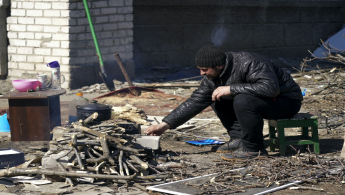Ukraine's humanitarian crisis 'tip of the iceberg': WHO
The humanitarian crisis unleashed so far by Russia's month-long war in Ukraine is just the tip of the iceberg, the World Health Organization warned on Wednesday.
The UN health agency also called for a stop to attacks on health care facilities, saying it has verified at least 64 such strikes.
"The problems we face so far... are really the tip of an iceberg of need," WHO emergencies director Michael Ryan said.
"And there's going to have to be a further, massive scaling up of assistance within Ukraine in the coming weeks, because I have never, myself, seen such complex needs, and so quickly in a crisis that has developed so fast."
"We have reached maybe, for once, an appropriate level of horror at what's happening in Ukraine," he said, citing the Russian siege of the southern port city of Mariupol, where tens of thousands of civilians are thought to remain trapped with no water, food or electricity.
With 3.6 million Ukrainians having fled the country, an estimated 6.5 million internally displaced, and a further 12 million affected by the conflict, roughly half the population was being impacted by the war, he said.
"That's an incredible, shameful statistic four weeks into this invasion," he told a press conference.
The WHO had received just $9.6 million of the $57.5 million required for the next three months in Ukraine.
From Warsaw to Beirut, volunteers lead the way in Ukraine's humanitarian response https://t.co/On2fA28hNJ
— The New Arab (@The_NewArab) March 9, 2022
There have been at least 64 confirmed attacks on health care, with more in the process of being verified.
"Attacks on health must stop. Health systems, facilities and health workers are not - and should never be - a target," WHO chief Tedros Adhanom Ghebreyesus said.
Ryan said that in Mariupol, even attempting to get someone to a hospital had become a life-threatening experience.
"The horror to sit and watch loved ones potentially die because you cannot take them to healthcare," he said.
"That in itself is an attack on healthcare: by terrifying people to the point where they cannot move to get water, food, healthcare.
"This is dehumanising at a level that is very hard to explain."
Tedros said the WHO was concerned for the integrity and safety of nuclear and chemical facilities in Ukraine, and urged all sides to minimise the danger of a catastrophic accident.
Ryan said that a war going on around such facilities created a "very high level of risk" to maintaining safety.
"There is another obvious layer to this, which is the horrific potential that weapons could be used, that are either chemical or nuclear in nature," he added.
"It's unconscionable even to think that that would be the case."
Nonetheless, he said: "We will be ready to support the medical implications of any intentional use of such weapons."





 Follow the Middle East's top stories in English at The New Arab on Google News
Follow the Middle East's top stories in English at The New Arab on Google News
![Netanyahu furiously denounced the ICC [Getty]](/sites/default/files/styles/image_330x185/public/2024-11/GettyImages-2169352575.jpg?h=199d8c1f&itok=-vRiruf5)
![Both Hamas and the Palestinian Authority welcomed the ICC arrest warrants [Getty]](/sites/default/files/styles/image_330x185/public/2024-11/GettyImages-2178351173.jpg?h=199d8c1f&itok=TV858iVg)
